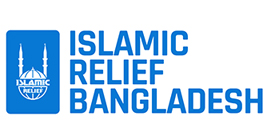In the heart of Mahmudpur Union, Nawabganj Upazila, Dinajpur, Laboni Akter’s story stands as a testament to resilience, determination, and the transformative power of opportunity. As a beneficiary of Islamic Relief’s SUPPORT project, she has successfully adapted to the challenges of climate change through the implementation of a climate-resilient integrated model farm while also establishing a thriving tailoring business.
Laboni’s journey was not without hardships. Determined to improve her livelihood, she initially took training in tailoring and started a small business from her home using a second-hand analogue sewing machine. With limited resources and a small customer base primarily consisting of her neighbours, she could only sew one or two garments per day, earning a modest income of 300 to 500 BDT.
However, as her skills and reputation grew, so did the demand for her work. Recognizing the limitations of her old sewing machine, she made a bold decision to scale up her business. As a rightsholder of the SUPPORT project, she accessed 30,000 BDT as a “Quard al Hasana” (interest-free loan) through her Self-Help Group (SHG). With this financial support, she invested in a digital sewing machine, significantly enhancing her efficiency and productivity.
 Beyond tailoring, Laboni embraced a holistic approach to climate resilience with the guidance of Islamic Relief. She integrated cow rearing, advanced goat and hen rearing techniques, and climate-resilient vegetable cultivation into her livelihood, ensuring both food security and income generation. To further sustain her farm, she adopted vermicomposting for her homestead garden and started Napier grass cultivation to address the scarcity of cattle feed in her area. These strategic adaptations have enabled her to create a self-sufficient, climate-resilient ecosystem at her home, reducing her dependence on external resources.
Beyond tailoring, Laboni embraced a holistic approach to climate resilience with the guidance of Islamic Relief. She integrated cow rearing, advanced goat and hen rearing techniques, and climate-resilient vegetable cultivation into her livelihood, ensuring both food security and income generation. To further sustain her farm, she adopted vermicomposting for her homestead garden and started Napier grass cultivation to address the scarcity of cattle feed in her area. These strategic adaptations have enabled her to create a self-sufficient, climate-resilient ecosystem at her home, reducing her dependence on external resources.
Today, Laboni’s income has increased by 50%, allowing her to sew four to five garments per day and earn a minimum of 1,000 to 1,200 BDT daily. Her diversified livelihood strategies have provided stability, ensuring she and her family have access to both nutritious food and financial security.
Laboni’s story is an inspiration—demonstrating how access to resources, skills training, and financial support can empower individuals to break the cycle of poverty and build resilience against climate challenges. Through her dedication and the support of Islamic Relief, she has transformed her life and secured a sustainable future.

